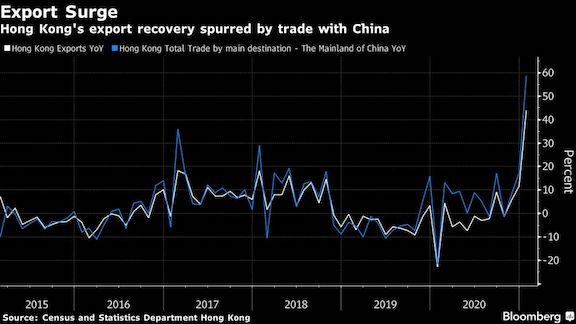Hong Kong exports soared the most since 1992 as trade picked up across Asia due to the timing of the Lunar New Year and a wider economic recovery on growing optimism about vaccines.
Exports climbed 44% from a year ago in January, better than the 30.5% median forecast among economists surveyed by Bloomberg. Imports also rose 37.7%, leaving a trade deficit of HK$25.2 billion ($3.9 billion), the government said Thursday.
Exports to China have been a key driver of Hong Kong’s nascent economic recovery as the mainland continues to lead the regional rebound from the pandemic. While Hong Kong’s economy posted a record 6.1% contraction overall in 2020, a surge in exports to the mainland beginning in September helped the city to return to quarter-on-quarter growth in the latter half of the year.

Trade across Asia has picked up, with exports to the region soaring 49.5% overall. The biggest increases were seen in Taiwan, up 73.2%, and China, with a 58.8% surge.
The Lunar New Year was in February this year but in January last year and that timing difference affected the results, the government report said. Companies were on holidays for some of January 2020, while many firms were rushing to get products out the door in January this year before going on holidays this month.
“Looking ahead, the mainland economy is expected to grow strongly, while import demand of the advanced markets should recover further if their epidemic situation gradually stabilizes,” the report said. “These developments bode well for Hong Kong’s exports of goods in the near term.”
Hong Kong’s economy will return to growth this year and expand between 3.5% and 5.5%, Financial Secretary Paul Chan forecast in his budget speech Wednesday, although that is dependent on the global rollout of vaccines to spur a return of external demand and international travel.
“We hope that from the second half of the year we will see more vibrancy in the economy,” Chan said at a press conference after announcing the budget.
Chan announced more than HK$120 billion of stimulus Wednesday including HK$5,000 in spending vouchers for each resident and loans for the unemployed. He also proposed raising taxes on stock transactions to generate more revenue and narrow an expected record budget deficit.








